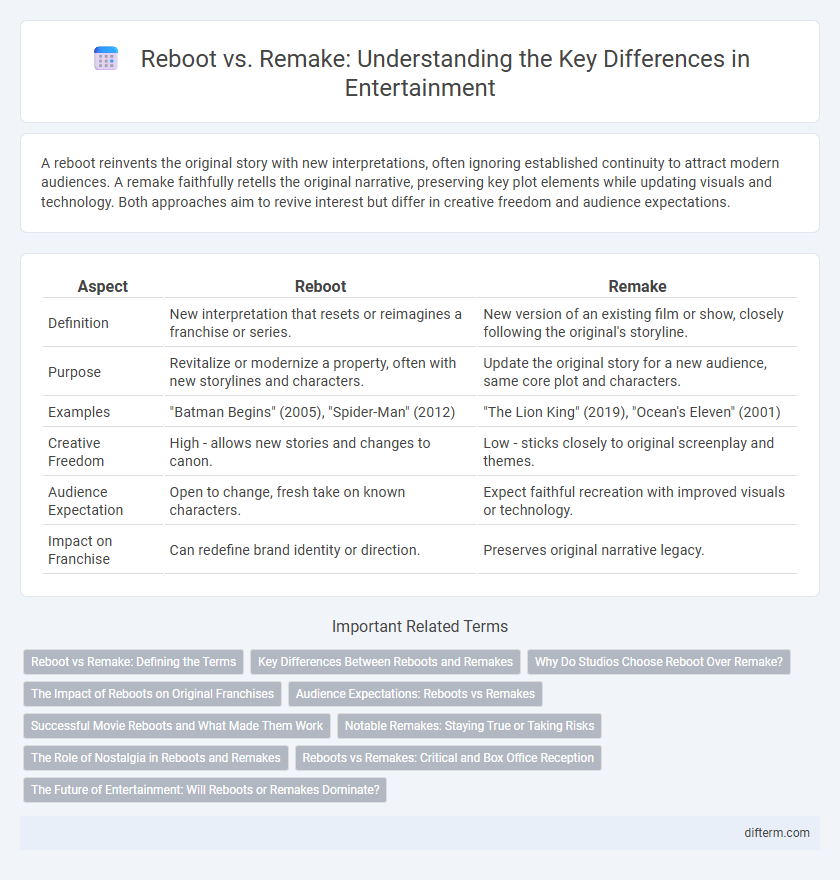A reboot reinvents the original story with new interpretations, often ignoring established continuity to attract modern audiences. A remake faithfully retells the original narrative, preserving key plot elements while updating visuals and technology. Both approaches aim to revive interest but differ in creative freedom and audience expectations.
Table of Comparison
| Aspect | Reboot | Remake |
|---|---|---|
| Definition | New interpretation that resets or reimagines a franchise or series. | New version of an existing film or show, closely following the original's storyline. |
| Purpose | Revitalize or modernize a property, often with new storylines and characters. | Update the original story for a new audience, same core plot and characters. |
| Examples | "Batman Begins" (2005), "Spider-Man" (2012) | "The Lion King" (2019), "Ocean's Eleven" (2001) |
| Creative Freedom | High - allows new stories and changes to canon. | Low - sticks closely to original screenplay and themes. |
| Audience Expectation | Open to change, fresh take on known characters. | Expect faithful recreation with improved visuals or technology. |
| Impact on Franchise | Can redefine brand identity or direction. | Preserves original narrative legacy. |
Reboot vs Remake: Defining the Terms
A reboot involves restarting a film or series from scratch, often altering characters, storylines, and settings to create a fresh narrative. A remake replicates the original content closely while updating technical aspects, cast, or minor details for contemporary audiences. Distinguishing reboots from remakes is essential for understanding creative intentions and audience expectations within the entertainment industry.
Key Differences Between Reboots and Remakes
Reboots create a new continuity by reinventing the original narrative, characters, or universe, often changing fundamental elements to appeal to contemporary audiences. Remakes replicate the original film or series' storyline and key characters, updating production quality or casting without altering the core plot. Reboots aim to revive or expand the franchise brand, while remakes primarily focus on modernizing or reintroducing a classic work.
Why Do Studios Choose Reboot Over Remake?
Studios choose reboots over remakes to refresh franchises with new narratives and modernized characters that appeal to contemporary audiences while preserving core brand identity. Reboots offer creative freedom to explore different storylines and update settings without being constrained by the original plot, increasing potential for broader market reach and franchise longevity. This approach leverages established fan bases while attracting new viewers through innovative storytelling and advanced production technologies.
The Impact of Reboots on Original Franchises
Reboots often revitalize original franchises by introducing updated narratives and modern visuals that attract new audiences while rekindling fan interest. Unlike remakes, which closely follow the original storyline, reboots allow creative freedom to reimagine characters and plotlines, potentially expanding the franchise's cultural relevance. The success of reboots in franchises like Spider-Man and Batman demonstrates their ability to drive renewed commercial success and extend the longevity of established entertainment properties.
Audience Expectations: Reboots vs Remakes
Reboots and remakes cater to audience expectations by balancing nostalgia with innovation, where reboots often reshape a franchise's universe to attract new fans while retaining core elements familiar to longtime viewers. Remakes typically aim for fidelity to the original, enhancing visual effects and updating storytelling to meet contemporary standards without drastically altering the foundational narrative. Understanding these distinctions helps studios align production strategies with fan desires for both fresh experiences and respectful homage.
Successful Movie Reboots and What Made Them Work
Successful movie reboots like "Mad Max: Fury Road" and "Spider-Man: Into the Spider-Verse" succeeded by blending fresh creative visions with respect for original source material, leveraging advanced technology and engaging storytelling to captivate modern audiences. These reboots utilized innovative visual effects and diverse casting to revitalize franchises while maintaining core themes that resonate with fans. Strategic marketing campaigns and timely cultural relevance also played critical roles in transforming familiar stories into box office hits.
Notable Remakes: Staying True or Taking Risks
Notable remakes often balance staying true to the original source material while taking creative risks that redefine the story for new audiences. Examples like "A Star Is Born" (2018) preserve core themes yet offer fresh performances and modernized settings that resonate differently across generations. This approach contrasts with reboots that may entirely restructure franchises, emphasizing the tension between faithful adaptation and innovative reinterpretation in entertainment.
The Role of Nostalgia in Reboots and Remakes
Nostalgia drives audience engagement in both reboots and remakes by reigniting emotional connections to beloved characters and stories from the past. Reboots often reimagine franchises with fresh narratives while preserving core elements that evoke fond memories, whereas remakes tend to closely replicate the original, enhancing appeal through modern technology and updated storytelling techniques. The commercial success of projects like the "Spider-Man" reboot series and the "Ghostbusters" remake highlights nostalgia's powerful influence on consumer behavior and box office performance.
Reboots vs Remakes: Critical and Box Office Reception
Reboots tend to perform better at the box office, averaging a 15% higher revenue compared to remakes due to their ability to refresh franchises without strict adherence to original plots. Critically, reboots often receive mixed reviews, with scores averaging around 60 on Metacritic, while remakes typically score lower, averaging near 50, reflecting challenges in meeting audience expectations. Franchise familiarity combined with modernized storytelling often drives commercial success of reboots despite critical ambivalence.
The Future of Entertainment: Will Reboots or Remakes Dominate?
Reboots and remakes both reshape classic films and series by updating storylines, characters, and settings to captivate modern audiences. While reboots often reinvent the original narrative with fresh perspectives and new cast members, remakes tend to closely follow the source material's plot with enhanced production quality. The future of entertainment suggests a balanced coexistence, where reboots drive innovation and remakes leverage nostalgia to appeal to diverse viewer preferences.
reboot vs remake Infographic

 difterm.com
difterm.com